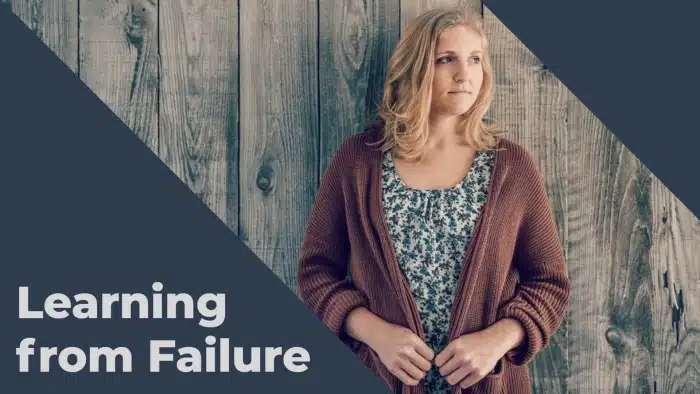
Learning from Failure: A Positive Approach for Success
How to deal with failure
Failure is inevitable. Experiencing failure is not something you can avoid in your life. There’s not been a successful person in the world that has avoided failure. When experiencing failures, or setbacks, you learn what works and what doesn’t. So the real question is: HOW do you want to fail? Failure is an unavoidable part of life, so you want to fail better. There’s a couple of different ways to fail:
Trying to avoid failure

Trying to avoid any and all failures won’t improve your life. In fact, trying to avoid failure will often work against you and your goals. With this way of failing, you won’t be giving yourself the opportunities to learn. You probably won’t learn any new skills, or gain helpful experience in what you’re attempting to master (achieve?) because you’ve stopped yourself from taking healthy risks.
Why would we work to avoid failure?
You might be telling yourself “I’m a failure” and experiencing the feelings that come with telling yourself this, and then avoiding anything where you may risk experiencing failure. Failure is an event, not a person. If you were a “total failure” you probably couldn’t leave home in the morning without perishing in some sort of disaster. Fortunately, this is not likely.
Failure can be your friend
When attempting new things in life, failure teaches us what doesn’t work, which then helps guide us to what does work. Failure is a common component of innovation, creativity, learning, and discovery. And it’s an important part of moving ahead in life.
There is no record (that we’re aware of) of anyone who created a masterpiece or noteworthy invention the first time they tried. Even if there is, how likely is it that this instant master would be one of us? The potential is there, but when most of us learn by doing, failing, and doing again… we fail better!
Failing Forward
The more sensible thinking and approach here is to view failure as a part of the process of learning our way to success. Thomas Edison famously failed many times while trying to create a practical electric lamp, but he changed the way he looked at those failures. Edison looked at failure as a part of the process of success – that he didn’t really fail, but he had learned a large number of ways that wouldn’t work and moved on.
I have not failed. I’ve just found 10,000 ways that won’t work.
— Thomas Alva Edison
He eventually created the Edison Electric Lamp (and many other things) and the rest is a big part of history. What Edison did was to fail forward… he failed better and kept going forward in his pursuit.
Taking healthy risks
The balance to seek is to take healthy risks that help us to learn and move closer to our desired goals.
Healthy risks vs unhealthy risks

Taking healthy risks can help you build your skills, your confidence, and further prepare you to physically and mentally move ahead in your efforts. Examples might include taking new classes or making new social and business connections. Some examples of unhealthy risks would include things like crime, smoking, drugs, drinking and driving, and the like.
Unhealthy risks will not help you build on what you have or better prepare you for opportunities. Experiencing failure in unhealthy risks can be a disaster for your overall well-being.
Why would we avoid healthy risks?
Most of us were taught from a young age that failure was always “bad.” Getting that big red “F” on a test in school drove home the idea that failures were a disaster.
When looking back, we can now see that it really didn’t harm our well-being, that it was simply a setback in our learning and that we may have missed an opportunity for ourselves because of our behavior or other conditions. That doesn’t mean that others don’t see failure as a disaster, however. In fact, this attitude is quite common, which may have affected your own thinking. Your self-talk may be filled with limiting beliefs that tell you not to take healthy risks, thinking it’s better to avoid them, and that your life will be better by avoiding all risks.
These thoughts may sound like:
-
- “I could never do that.”
- “I couldn’t stand it if it doesn’t work out with her.”
- “I’d be too embarrassed to join a gym.”
- “I’m not good enough.”
- “It’s too hard for me to change.”
Practice listening to the “self-talk” that you tell yourself in order to change this old-and-broken way of thinking (beliefs that hold you back) and replace that unhelpful thinking with new and practical beliefs that help you get ahead.
A single failure doesn’t mean it’s time to give up
Thinking that a single failure is a disaster, and thus giving up on the things you want in your life, is be based on your self-talk and limiting beliefs. You may be telling yourself things like:
-
- “It’s just no use. I’ve failed.”
- “I’ll never work this out.”
- “Why do I even try?”
- “I can’t take it when I fail.”
Setbacks can be frustrating, and this sort of self-talk may lead you to giving up completely because of the frustration and anger you are feeling.
There are no secrets to success. It is the result of preparation, hard work, and learning from failure.
— Colin Powell
Failure when taking healthy risks is not a disaster
Let’s say that you want someone as a new friend, and after approaching them, it just doesn’t work out. What does this say about you? Are you now “a failure?” Of course not! You may have even worked past some old limiting beliefs like:
-
- “I’m too afraid to do this.”
- “I’m too shy to try.”
- “I’m always getting rejected, so why try at all?”
Even though it didn’t work out, you might see working past your limiting beliefs is a success, and it’s not a failure at all. Though this particular situation didn’t work out, you can walk away with more confidence that you tried in the first place, and that you can try again.
Debating your old beliefs about failure
When limiting beliefs try to talk you out of taking healthy risks, you can debate them. Let’s say that your self-talk is saying “What if I get turned down?” and this is preventing you from taking a healthy risk. You can challenge these thoughts with simple questions like “So what? Will I be worse off than I was by avoiding to try?” Changing your old limiting beliefs about taking a risk and experiencing failure can open you up to new healthier opportunities.


0 Comments